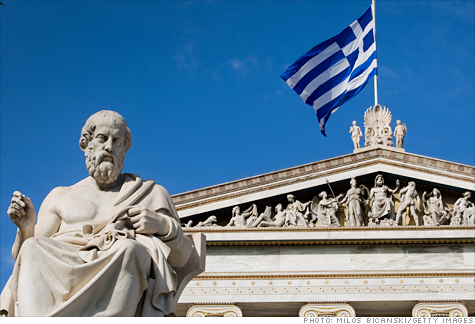
FORTUNE -- The opportunity for debt-troubled Europe to avoid a disaster is shrinking. Fast. Over the weekend, Greek leaders struggled to agree to a set of radical budget cuts as the country approaches an October deadline to qualify for $11 billion in aid without which it will certainly default on its growing debt.
As the bailout of Greece spirals into a costly mess, officials have raised the idea of an "orderly default." Germany's economy minister Philipp Roesler publicly introduced the concept and, needless to say, the mere mention of bankruptcy was anything but calming for global investors.
German Chancellor Angela Merkel stepped in, telling BBC News that the eurozone must stick together and that there aren't any procedures underway to ease Greece into a default that promises a softer landing. Merkel may have been trying to allay investors' fears, but most now see it for what it is: Greece is already preparing for what it hopes will be an orderly default, even though the country has not yet technically declared bankruptcy.
An orderly default is equivalent to restructuring debt -- whereby creditors accept a loss while debtors agree to pay most of its debts. In July, European Union leaders agreed to a rescue plan for Greece worth more than $150 billion, which would help it cover its financing needs for the next several years. One of the key elements of the plan, which is awaiting final approval, is a bond swap deal in which Greece's debt burden is reduced, while the country's private-sector creditors agree to accept new bonds worth less than their original holdings.
In the past, other nations have pulled off orderly defaults successfully. Could Greece, Ireland, Italy and other troubled nations in the eurozone do the same? Judging by the general surge in bond yields of the peripheral countries, it looks less likely.
What happens after a Greek default
Developing nations have completed orderly defaults before. For instance, the Brady bonds in the late 1980s and early 1990s arose from an effort to reduce debt held by mostly Latin American countries that were frequently defaulting on loans.
The Ukraine and Pakistan have also defaulted in orderly fashion. So did Uruguay in 2003. The country successfully did a voluntary bond swap in which the government offered to exchange bonds coming due in a few years for similar ones that matured later. The move was enough to convince investors that its problems were temporary and that with time, Uruguay would be better off since its growth prospects were strong.
But for Greece, economists believe austerity measures attached to its rescue package will slow economic growth and weaken the country's competitiveness for years to come. What's more, orderly defaults in industrialized nations are essentially unprecedented, which partly explains why investors are so spooked by what's happening in the eurozone.
"One of the founding pillars is this concept that the debt of industrialized countries is risk free," says Jacob Funk Kirkegaard of the Peterson Institute for International Economics. "Markets are asking if it turns out there's risk in Greece maybe there are other countries in the industrialized world that face the same issues."
Hope for a soft landing
One of the big hopes, if the eurozone's debt crisis worsens, is that it would force a larger rescue fund, such as dramatic expansion of the European Financial Stability Facility. Italy is one of the eurozone's biggest debtors and its heavy debts have raised questions about the health of European banks, which have bought bundles of Italian bonds. The problem is that Europe's emergency bailout resources are far from enough to support anything more than smaller countries such as Greece, Portugal and Ireland.
One of the glaring weaknesses that the debt crisis has exposed is the lack of a common treasury in the construction of the euro, financier and businessman George Soros has said. While the EFSF is tasked with providing a safety net for the eurozone as a whole, the fund merely has the ability to raise money, leaving governments of member countries with authority over how to spend it.
"This renders the EFSF useless in responding to a crisis; it has to await instruction from the member countries," Soros wrote earlier this month in The New York Review of Books.
To be sure, eurozone leaders did widen the EFSF some but refused other bigger expansions during a summit in July. Committing much more money would likely have helped convince global markets that the fund is big enough to can handle just about anything -- even Italy. Several key governments, including France and Berlin, oppose strengthening the fund. And understandably so, since agreeing to pledging ever-growing sums of money to weak European states could strain the finances of some governments while causing political havoc for those dealing with disgruntled voters.
Nevertheless, the International Monetary Fund has urged eurozone leaders that a much bigger fund is needed. It remains to be seen how much influence the global lender has, but perhaps the possibility that the organization might share some of the financial burden in resolving the crisis could bring more support for a much grander EFSF.
A default -- however orderly or disorderly -- hasn't been able to calm markets. Spooked investors might likely find calm in an expanded EFSF. ![]()
| Overnight Avg Rate | Latest | Change | Last Week |
|---|---|---|---|
| 30 yr fixed | 3.80% | 3.88% | |
| 15 yr fixed | 3.20% | 3.23% | |
| 5/1 ARM | 3.84% | 3.88% | |
| 30 yr refi | 3.82% | 3.93% | |
| 15 yr refi | 3.20% | 3.23% |
Today's featured rates: